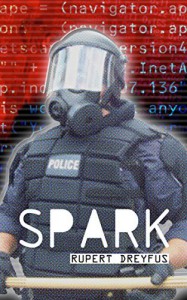The Lexical Funk!
Daniel has wanted to be a writer ever since he was in elementary school.He has published stories and articles in such magazines as Slipstream, Black Petals, Spindrift, Zygote in my Coffee, and Leading Edge Science Fiction. He has written four books: The Sage and the Scarecrow (a novel), the Lexical Funk (a short story collection), Reejecttion (short story/ essay collection), and The Ghosts of Nagasaki (a novel).
A Little Revolution for Your Literary Diet (Review of Spark)

There is more than a little despair, more than a little anger, more than a little revolution in Dreyfus’s Spark. There is an easy, effortless story-telling, memorable characters, and fantastic pacing that make this book hard to put down.
There is also more than a little “Fight Club” in the book here, including a scene with a character baiting another character into punching him in the face. There is an anti-establishment theme that seems timely, but also a bit lost. There is humor. Much dryer and lonelier and desperate than anything I remember in “Fight Club.” It seems to come from an honest place.
Criticisms? There are some.
There is a romantic element to the book that is teased and then evaporates fairly soon.
As far as a critique of modern and postmodern elements of life, there is a guttural but not necessarily deep rendering. Yes, stale corporate nonsense is dehumanizing -- what Nassim Nicholas Taleb has called “repetitive stress” injury. Yes, it’s easy to become lonely and lost in big cities. Yes, the internet has made it easier for us to crawl into small, imaginary tribes (that fail to provide the meaning of pre-modern tribes). But, beyond that, what does the book have to offer those who grapple with big questions about society?
A novel is no place for philosophy, but often philosophy can become the lubricant for real dramatic tension, sharpening stakes and making us empathize with characters and their struggles. The character of Plato seemed like he might just be the person to bring this more nuanced voice.
Late in the game, Plato does bring some insight for Jake, but the particular framing of Jake’s problem didn’t seem as poignant as it could have been. What is it about modern and postmodern living that makes the good life less possible? Is it abundance without work? Is it the alienation of people from the fruits of their labor? Is is the Fordist curse of routine and the post-Fordist curse automation and endless information?
If the narrator Jake was Holden Caulfield, then Plato could have played the role of Mr. Antolini, offering a kind of frame that connected Vinnie, big banks, government, and his loneliness together into some sort of coherent frame, even if that frame is ultimately shattered. (In the end, Mr. Antolini wasn’t able to solve Holden’s problem partially because the intellectual frame was too small and rigid for the vastness of the problems Holden was facing).
In a crucial moment of the book, Plato has a moment to put the novel in coherent framework -- something about the relationship between meaning-making and nihilism. I’ll let you read it for yourself and decide if it works.
The pacing of the book is excellent, but in the middle Jake starts spending more time alone...thinking. As someone who has written a book about someone wandering and thinking, I can tell you with absolute authority, there is no better way to kill narrative momentum than to have a guy walk and think. Mercifully, these bouts are rather short and are largely an aberration in a narrative that moves at a runner’s pace.
In the end, Spark is an excellently paced work of dark humor that will have you asking for more.



